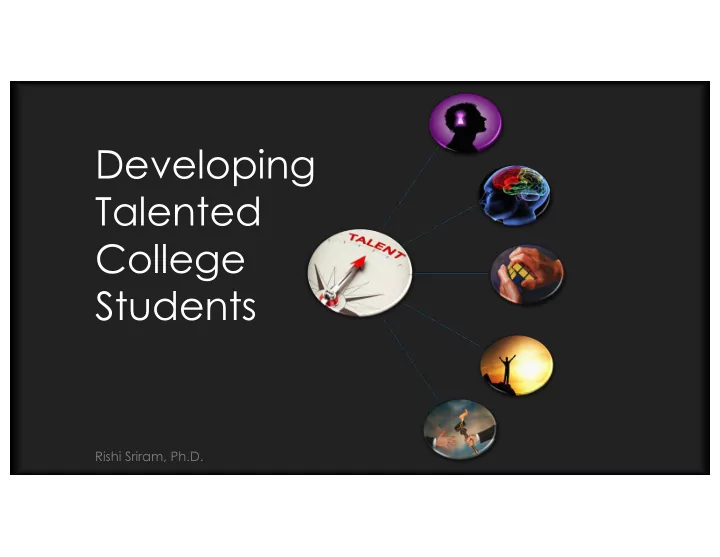

Developing Talented College Students Rishi Sriram, Ph.D.
“Developing students’ talent is, after all, the principal mission of any educational institution–to help students learn, grow, and develop into competent and responsible citizens, parents, employees, and professionals.”
talent
Mindset
Mindset The beliefs we have about the capacity to change talent
Myelin
Some recent philosophers We must seem to have given their protest and moral approval to react against these deplorable this brutal verdicts that pessimism ; affirm that the we will try to intelligence of demonstrate an individual is that it is a fixed quantity , founded on a quantity that nothing. cannot be augmented.
Have you ever seen a picture of talent?
Myelin
How?
Mastery
Source of Talent What does the research say?
• 7,410 Best hours • 5,301 Good hours • 3,420 OK hours
10-year-rule 10,000 hours
Difficult Practice • Effortful • Not always enjoyable • Reflective • Trial and error • Focus on correcting errors • Practice for improvement 10,000 hours
Difficult Practice How can anyone stomach 10,000 hours?
Motivation
Motivation • Passion • Calling • Agency • Ignition
Flow • Forget time • Forget fatigue • Consumed in the activity itself
It’s All About What Motivates You
Motivation 3 C's Competence Choice Community
Mentorship
Mentorship • Master teacher • Invests in you • Knows their stuff • Knows how to teach • Breaks down teaching into 2 components
What Do Great Mentors Do? Performance Feedback
There is no such thing as innate talent.
There is no such thing as innate talent. Talent is cultivated. Talent is developed. Talent is earned.
What does this mean for college students?
It All Comes Down to Learning • Mindset • Myelin • Mastery • Motivation • Mentorship
Does the research on college students support this?
Research Robbins et al. 2006 on Mastery Journal of Educational Psychology • Sample of 14,000+ students from 48 institutions • Academic Discipline was the best predictor of GPA & retention “the amount of effort a student puts into schoolwork and the degree to which he or she sees himself or herself as hardworking and conscientious”
Research Crede et al. 2010 on Mastery Review of Educational Research • Meta analysis of 21,000+ students • Class Attendance “These relationships make ___________ a better predictor of college grades than any other known predictor of academic performance , including scores on standardized admissions tests such as the SAT, high school GPA, study habits, and study skills.”
Research Sriram, R. 2014 on Mindset Journal of College Student Retention • Teaching high-risk students a growth mindset greatly improves their academic effort Is what we do and say with our students communicating a growth mindset or a fixed mindset?
Research Jay, M. 2012 on Myelin The Defining Decade: Why Your Twenties Matter • Myelination is vital to talent • Frontal lobe is the last part of the brain to myelinate • This myelination occurs during the 20s How can we help our students understand how important the college years are for brain development?
Research on Akos & Kretchmar 2017 Motivation The Review of Higher Education • Grit: • Passion & Perseverance toward long-term goals • Difference between a GPA of 3.0 and 3.35 How often do we talk about purpose, calling, or vocation with our students? How else will they “stomach” what it will cost to become talented?
Research on Crisp & Cruz 2009 Mentorship Research in Higher Education • Meta analysis of mentorship in college • Increase in retention, graduation rates, and comfort w/ campus • Especially for first-year Latino students How do we connect our students with people who will invest in them and provide constant, specific feedback?
The Talent of Our Students 8 7 6 5 4 3 2 1 0 High-Achievers Typicals Underprepareds How We Get'em What We Add
How can you arrange your people, programs, and policies to promote these 5 M’s?
“Our 4,000-plus institutions of higher learning have come to value merely being smart more than developing smartness!”
It’s Time We Change That.
Recommend
More recommend
Stay informed with curated content and fresh updates.